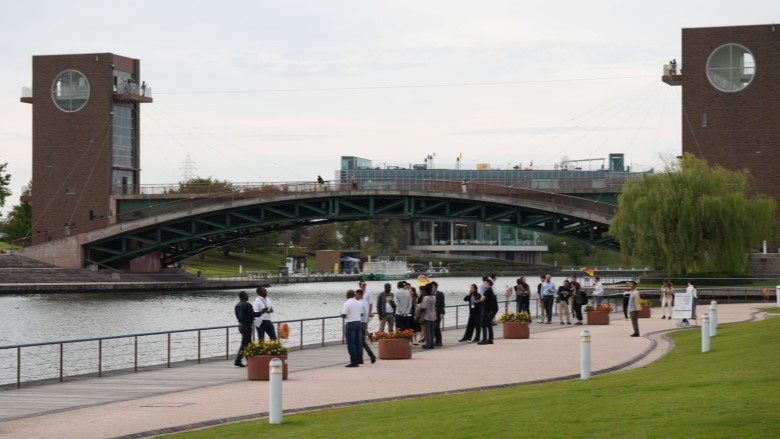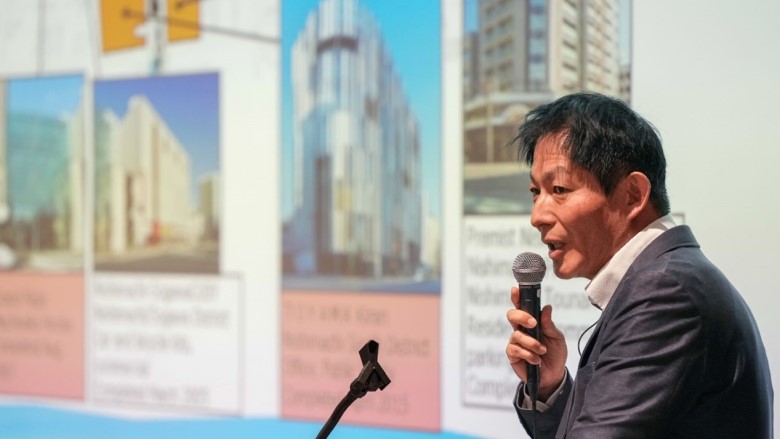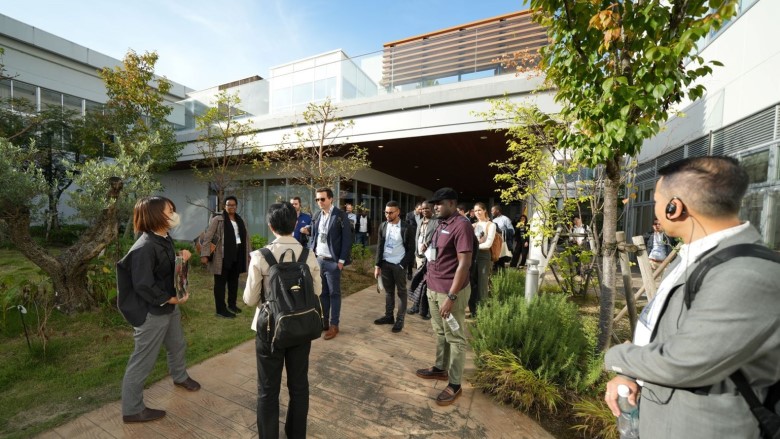
The world is currently facing several crises, namely COVID-19, climate change, invasion of Ukraine, and food shortages. Developing countries struggle with fiscal and capacity constraints to meet the Sustainable Development Goals 2030. They require a total of $1.5 trillion annually between 2015 and 2030 for low-carbon, climate-resilient infrastructure. While the long-term benefits are clear, financing remains a significant challenge.
Considering these circumstances and the increasing risks of climate change, it is now more critical than ever to deliver sustainable, high-quality infrastructure investment and essential services to support green, resilient, and inclusive development. To achieve this, scarce public resources must be used as efficiently as possible, and country governments and MDB partners need to seek innovative solutions to mobilize more finance into infrastructure investment.
The purpose of the Financing Quality Urban Infrastructure TDD was to provide participants with an opportunity to develop a better understanding of the importance of infrastructure investment adhering to QII principles. Participants were taught practical ways to improve the quality of their urban infrastructure investment and introduced to innovative methods to mobilize finance and leverage digital technology to provide better services to the population.
Client Challenges Covered
Many delegations reported that they need more funds to further their infrastructure projects. They maintained that starting new infrastructure projects is particularly difficult in countries with high debt or those that have to divert public funds to other sectors. In terms of the public-private partnership (PPP), they noted that local private companies are interested in public infrastructure projects but have yet to enter the market due to concerns about market stability. Lastly, they pointed out that the existing infrastructure requires further improvement and development to address climate change issues.
Summary of TDD Sessions:
The following topics were discussed at this TDD.
a) Key elements of quality infrastructure investment
- Implementing quality infrastructure investment (QII) can promote green, inclusive, and resilient development. However, QII is not just limited to the construction and operation of infrastructure. In a broader sense, it encompasses the positive social impact it can have, including creating job opportunities, boosting local economy and promoting sustainable development.
- The concept of Quality Infrastructure Investment (QII) has gained significant importance in Japan due to various challenges faced by the post-war Japanese society, such as rapid urbanization, environmental issues, aging infrastructure, and a declining population. To tackle these problems, there was a need to create a more sustainable infrastructure that is environmentally and socially friendly. Yokohama's post-war urban development, also known as the Six Major Projects, incorporated the principles of QII, which have now become the foundation for creating a decarbonized city.
- Persons with disabilities face higher rates of multidimensional poverty. Therefore, it is crucial to promote inclusive infrastructures, like universal design, which benefits not only the physically challenged and the elderly but also the non-disabled individuals. In Indonesia and other developing countries, such universal design initiatives are making progress. They enhance accessibility in people's daily lives and contribute to economic activities, such as boosting tourism.
b) Economic efficiency and mobilizing finance for quality infrastructure investment.
- Many governments and municipalities face fiscal deficits due to the increasing costs of climate change response mechanisms and related goods and services. To address this challenge, they should explore different borrowing instruments, such as bonds and loans, and value capture instruments, including impact fees and special assessment districts. Public-private partnerships, particularly concession schemes, are also crucial to mobilizing private capital and reducing the costs associated with establishing and maintaining infrastructure.
- A government may use public-private partnerships for various reasons, such as decreasing initial expenses, enhancing operational efficiency, mitigating risks in case of contract breaches, ensuring high-quality project outcomes, and considering long-term costs. However, to effectively implement public-private partnership projects, it is essential for the government to carefully select private companies, determine which aspects of the project will be outsourced to them, establish contracts that appropriately factor in potential risks, foster an environment that encourages multiple private companies to express interest in the project, and maintain transparency throughout the project implementation process.
- It is difficult to promote public-private partnerships without a thorough understanding of the private sector. In the case of Toyama City, the city has established an information-sharing platform with local financial institutions and private companies and has held regular dialogues with them. Through this process, the city has introduced Toyama City's vision, the needs of the local government, and how to proceed with the project while deepening its understanding of the market and the strengths and weaknesses of private companies. These ongoing dialogues have led to concrete PPP initiatives, including implementing social experiments.
c) Leveraging digital transformation for urban infrastructure and services Locations for site visits The following facilities were visited during this TDD: The Kawai Water Purification Plant, owned by the City of Yokohama, is one of the oldest water filtration plants in Japan. In 2009, it was reborn as Japan's first PFI-based Water Filtration Plant. In this project, the Waternext Yokohama Corporation financed and built the new facility, and transferred ownership to the Yokohama City Waterworks Bureau. After the installation, the same private company has been involved in operation and maintenance (BTO method). The Sogawa Legato Square project is Toyama City's compact city policy initiative. The project integrates the development and operation of public and private facilities under the theme of "Medical, Welfare and Health." By integrating medical, welfare, and health facilities (both private and public facilities) in one area and through collaboration between the public and private sectors, the project provides a comprehensive solution for the challenges faced by the city.
Toyama City introduced the nation's first "upper and lower separation system" in the tram business in Japan. The "upper and lower separation method" involves the government of Toyama City acting as a "track maintenance business operator" by building tracks and purchasing rolling stock, while the Toyama Chihou Railway operates the rolling stock as a "track transportation business operator." The model is centered around the concept of publicly owned establishments being managed by private entities. The Middle Hall is a symbolic space that promotes Toyama citizens' arts and cultural activities. It includes a medium-sized hall that was developed through PFI (BTO). Fugan Unga Kannsui Park is part of the "Toyama City MIRAI (Future) Plan," which aims to revitalize the Toyama Station North District by making use of formerly unused spaces such as former railroad sites and canal docks. The plan seeks to create a dynamic urban center that will lead Toyama's industry and culture in the 21st century, with active participation from the private sector. The park is home to Starbucks Coffee, which is popular for it’s shop interior. It was also the first in Japan to adopt the Installation Permission Management System, a pioneer program of Japanese PFI. Action Planning Many delegates reported that their participation in the TDD had resulted in a deeper understanding of the QII Principles and the nature of PPPs. As a result, they have identified the following action plans upon their return: 1) Capacity building on PPPs in their respective countries, as well as the establishment of a PPP fund and committees. 2) Preparation of a roadmap to promote smart cities and resilient infrastructure. 3) Review of procurement, project implementation, and evaluation methods in line with the QII Principles. Participant Feedback A survey to measure participant satisfaction was conducted immediately after the TDD. The survey results indicate that the event was highly satisfactory for most participants. 91% of the survey respondents (n=33) reported that they were "very satisfied" with the event. This is the highest level of satisfaction recorded for any TDD to date. Furthermore, 73% of the respondents stated that the TDD was "very relevant" to their project, while 27% stated that the TDD was "relevant" to their project. These results suggest that the TDD provided valuable insights for most participants' projects. Many participants appreciated site visits in Japan, stating that they could comprehend the implementation of PPPs during their visits to Yokohama and Toyama. However, some expressed their desire for a more comprehensive overview of PPP in Japan. Note Toyama City was fully cooperative during the TDD, and we were delighted to have the Mayor of Toyama City, Mr. Hirohisa Fujii, represent Toyama City on Day 3 and at the reception. Additionally, Mr. Shinji Honda, Senior Policy Administrator, provided valuable feedback to the delegations on the Action Plan on the fifth day. Toyama City offered constructive suggestions with respect to presentations and inspection tours, enabling us to have productive sessions in Toyama.
